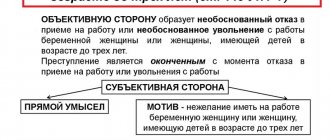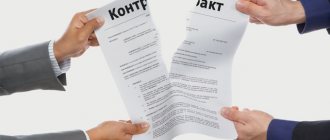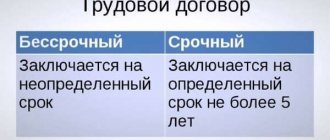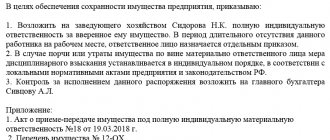In general, the employer-employee relationship looks like this.
The employer selects a person among applicants based on professional qualities. An employment contract is concluded with the employee for specific duties and salary. The employee performs the assigned work and rests at the appointed time. The employer pays money twice a month, provides insurance in case of illness and injury, and monitors labor safety. Dismisses strictly for reasons specified in the Labor Code of the Russian Federation.
If somewhere in this chain an employee is discriminated against, the employer is held accountable.
Types of liability: material, administrative and criminal. Each responsibility is independent - you can get into two or three at once.
We tell you why entrepreneurs are punished and how to make sure that the risk of liability tends to zero.
Financial liability to the employee
Financial liability is when an employer pays money to an employee for illegal dismissal, delayed wages, damage to property and violation of other rights.
Here's what the employer is specifically responsible for:
Lost earnings for deprivation of the opportunity to work - Art. 234 Labor Code of the Russian Federation.
If an employee is left without a job or does not get a new one due to violations of the law by the employer, he receives a salary. The money is paid for the entire time the person did not work.
Lost wages are due for:
- dismissal without reason - fired for absenteeism, although the person was at a session at the university;
— transfer to another job without the employee’s consent — a restaurant administrator was demoted to a food delivery courier;
- failure to issue a work book on the day of dismissal or an error in the entry - a person will not be hired without a work book, and the wording of the dismissal can harm the reputation.
Interest for delay of money - Art. 236 Labor Code of the Russian Federation.
A person is given a salary on the dates specified in the employment contract. Upon dismissal, the remaining salary and vacation compensation are paid on the last working day. There are other payments: for working at night or using a personal laptop in the office. All payments have exact deadlines.
For violation of deadlines, the employer pays the employee interest. The amount is 1/150 of the key rate of the Central Bank of the Russian Federation of the unpaid amount for each day.
Compensation for damage to employee property - Art. 235 Labor Code of the Russian Federation.
It happens that an employee uses personal property at work.
When an item is lost or damaged due to the employer's fault, the employee receives money or an equivalent item. To do this, the employee writes a claim for damages. The employer sorts it out within ten days, pays the money or refuses. The refusal does not prevent the employee from going to court.
The woman worked at the hospital as an exercise therapy instructor. On one of the shifts, the orderly, on the instructions of the head nurse, threw out jeans, a jumper and a shawl from her personal closet. The reason was explained by the fact that the things were lying together with overalls, and this is not allowed.
The exercise therapy instructor went to court and sued the hospital for the cost of the clothes, and on top of that there was also money for moral damages, lawyer’s fees and product examination.
According to SanPiN for medical institutions, a personal closet must have two sections - for separate storage of personal and work clothes. The hospital management did not take care of such cabinets. The employer is at fault in the incident with the thrown clothes, so he is obliged to compensate the employee for damages - case No. 33-511.
Average earnings during suspension of work due to delayed wages - art. 142 Labor Code of the Russian Federation.
When there is no salary for more than 15 days, the employee has the right not to go to the workplace. He is only required to warn management in writing.
A person is required to go to work the next day after notification of readiness to transfer money.
The time of such a “strike” is not absenteeism and the entrepreneur pays the employee the average salary.
Registration of an employee
The court reinstates an employee who was fired illegally. The entrepreneur will have to look for a new basis for terminating the employment contract. In the meantime, he’s looking to pay his salary.
The court turns work in the state disguised as a contract into an employment contract under Art. 19.1 Labor Code of the Russian Federation. For the past time, obliges to transfer contributions to social security.
The court obliges the court to conclude a fixed-term employment contract without economic need or consent of the employee for good under Art. 58 Labor Code of the Russian Federation.
Formally, forced registration of an employee on the staff does not apply to financial liability. But in such situations, entrepreneurs lose money and get an unwanted employee into the business.
Compensation for moral damage - Art. 237 Labor Code of the Russian Federation.
People are worried about violations of labor rights. The salary was delayed - I had to step over myself and borrow from a friend.
The employer is obliged to compensate for the worries with money. The amount of compensation is as agreed by the parties. If an agreement cannot be reached, the court will determine the amount.
The employer's financial responsibility can be increased in the employment contract. For example, increase the percentage for late wages. But you can’t downgrade or cancel it at all. This is the rule from Art. 232 Labor Code of the Russian Federation.
Ideally, the employer pays the money at the request of the employee. I gave my work book two weeks later and paid half the salary for my inability to get a new job. In reality, violations of workers' rights usually result in a fundamental dispute and litigation. In the end, the employer pays the money according to the court decision.
The entrepreneur hired a cashier at the store. According to the employment contract, the cashier received a salary of 11,000 rubles, and according to the additional agreement, a percentage of sales. Apparently, there was also a verbal agreement and in fact the woman received only a percentage of sales. And they didn’t even transfer taxes from the official salary. After nine months, the cashier resigned of her own free will. The entrepreneur did not formalize the dismissal, did not issue a work book, and did not pay wages or compensation for vacation. This turned out to be reckless.
The cashier went to court. We were suing for more than a year, the debt and interest grew like a snowball. As a result, the employee received:
— 103,586 ₽ — unpaid wages;
— 6,771 ₽ — compensation for vacation;
— 28,280 ₽ — interest for delayed salaries;
— 50,000 ₽ — compensation for moral damage;
— 169,888 ₽ — lost earnings due to an unissued work book.
The court also ordered the entrepreneur to transfer personal income tax and contributions to the Pension Fund - case No. 33-11587/2018.
Such amounts in favor of the employee are a common outcome of a labor dispute in judicial practice. The scale of the employer’s business and money turnover do not matter to the court.
Submit reports in three clicks
Elba will calculate taxes and prepare business reports based on the simplified tax system and patent. It will also help you create invoices, acts and invoices.
Try 30 days free Gift for new entrepreneurs A year on “Premium” for individual entrepreneurs under 3 months
Violations related to wages.
The most common reasons for complaints regarding wages are:
- Payments of wages less than twice a month.
- Delay of wages without valid reasons for more than 15 days.
- Failure to pay all amounts due upon termination of an employee.
It should be noted that during dismissal, all payments due to the employee must be transferred to him on the day of termination of the employment contract.
Administrative fines from the labor inspectorate
The labor inspectorate monitors the rights of workers.
Based on a person’s complaint, inspection specialists come to the employer and check. If the complaint is true, the entrepreneur is brought to administrative responsibility: he is fined and the order tells him what to correct.
Small companies face fines under Art. 5.27 and 5.27.1 Code of Administrative Offenses of the Russian Federation:
— Dismissal without reason, fixed-term employment contract without reason, refusal to take leave, etc. — up to 20,000 for an individual entrepreneur, up to 70,000 rubles for an LLC;
- Refusal to sign an employment contract if a person has started work - up to 5,000 rubles for an individual entrepreneur, up to 20,000 rubles for the director of an LLC;
— Covering labor relations with a contract — up to 40,000 rubles for individual entrepreneurs, up to 200,000 rubles for LLCs;
- Delay of salaries and other payments - up to 30,000 rubles for individual entrepreneurs, up to 100,000 rubles for LLCs;
- Violation of labor protection and special assessment of workplaces - up to 40,000 rubles for individual entrepreneurs, up to 200,000 rubles for LLCs.
Disciplinary responsibility
Labor relations are regulated by legislative acts, as well as collective agreements and local instructions. Accordingly, any official who improperly performs his assigned job duties is subject to disciplinary liability.
The fact of a disciplinary violation provides for the following types of penalties:
- Comment.
- Rebuke.
- Dismissal.
All of the above measures can be applied to the employee. Heads of departments bear disciplinary liability in the event of:
- making an unfounded decision that entailed irreversible consequences;
- gross violation of labor duties;
It should be noted that dismissal is a last resort measure, which is applied only in the case of proven facts of neglect of legal requirements.
Criminal liability
Criminal liability - when the employer violated the law and people were seriously injured.
The prosecutor's office and investigators are investigating the violation. The entrepreneur or director is at this time in a pre-trial detention center or under house arrest. The investigation ends with a trial and punishment in the form of a fine, compulsory labor or imprisonment. The person gets a criminal record.
Criminal liability occurs for the following:
— Violation of labor protection if people were injured or killed under Art. 143 of the Criminal Code of the Russian Federation;
— Dismissal of a pregnant woman or a woman with children under three years of age under Art. 145 of the Criminal Code of the Russian Federation;
— Delay of salary due to selfish purpose under Art. 145.1 of the Criminal Code of the Russian Federation.
Articles of the Criminal Code are not intimidation. Business leaders are punished with real prison sentences for shortcomings in labor safety and delays in salaries.
Types of liability
Types of liability for non-compliance with labor legislation are enshrined in Art. 419 Labor Code of the Russian Federation.
Persons who have violated labor laws and other regulations are subject to the following types of liability:
- disciplinary;
- material;
- civil law;
- administrative;
- criminal
Let's look at each of them in more detail.
How can an employer avoid liability?
You can protect yourself from inspections and writs of execution for cosmic sums in a way that is simple in words, but difficult in life. This way is to know the rights of the employee and the responsibilities of the employer.
If your business is based on the work of hired personnel, look for an experienced outsourced HR specialist. Specialists will help you avoid errors in the system.
You can study the law point by point - look at information on an issue that needs to be dealt with right now. Look in our help section about working with employees and taxes.
Rostrud has a website onlineinspektsiya.rf. Its purpose for employers is to tell them how to properly register their staff and not get fined. The site has a useful self-test service. You can also find documents there and read inspectors’ answers to frequently asked questions.
Administrative responsibility
Administrative measures are enshrined in the Administrative Code of the Russian Federation. In most cases, non-compliance with legal standards is discovered during scheduled or unscheduled inspections of organizations by the State Labor Inspectorate. Less often - at the request or complaint of an employee.
The algorithm for initiating a case on administrative liability and the specifics of its consideration are prescribed in Chapters 28-29 of the Code of Administrative Offenses of the Russian Federation.
Responsibility of parents for non-fulfillment or improper fulfillment of parental responsibilities
The Constitution of the Russian Federation establishes that caring for children and raising them is an equal right and responsibility of parents (Part 2 of Article 38 of the Constitution of the Russian Federation).
In accordance with Art. 63 of the Family Code of the Russian Federation, parents have the right and obligation to raise their children. All these responsibilities are enshrined in Articles 64 and 65 of the Family Code of the Russian Federation.
Responsibility for the upbringing and development of children is common and binding for both parents, no matter where they are. Temporary transfer by parents of their children to relatives, strangers, or to one of the child care institutions does not relieve parents of responsibility for the upbringing and development of children. Parents and persons replacing them bear responsibilities for raising children until the child reaches adulthood.
What parental responsibilities are provided for by federal law?
The current legislation of the Russian Federation provides for various types of liability for failure to fulfill or improper fulfillment of one’s duties in raising children.
Criminal liability
Article 156 of the Criminal Code of the Russian Federation provides for criminal liability for failure to fulfill or improper fulfillment of duties for the upbringing of a minor by a parent or other person entrusted with these duties, as well as by a teacher or other employee of an educational, training, medical or other institution obliged to supervise a minor, if this the act is connected with cruel treatment of a minor.
Article 157 of the Criminal Code of the Russian Federation provides for criminal liability for malicious evasion of a parent from paying alimony: “Malicious evasion of a parent from paying, by a court decision, funds for the maintenance of minor children, as well as disabled children who have reached the age of eighteen” is punishable by correctional labor for up to one year, or forced labor for the same period, or arrest for a term of up to three months, or imprisonment for a term of up to one year.
Civil liability
For failure to fulfill or improper fulfillment of responsibilities for raising children, parents can also be brought to civil liability.
The possibility of recovering compensation in favor of a child for causing moral or property damage to him is not directly provided for by family law, but follows from the provisions of Art. 151, 1064, 1099 Civil Code of the Russian Federation. A parent who has committed violations of his duties, has not fulfilled his obligations to provide the child with food and clothing, which resulted in harm to the child’s health, may be brought to civil liability in the form of compensation for moral damage and damages.
Responsibility provided for by the Family Code of the Russian Federation
In accordance with Art. 69 of the Family Code of the Russian Federation, parents (one of them) may be deprived of parental rights if they:
- evading the duties of parents, including malicious evasion of alimony payments;
- refuse, without good reason, to take their child from a maternity hospital (ward) or from another medical institution, educational institution, social welfare institution or similar organizations;
- abuse their parental rights;
- children are cruelly treated, including physical or mental violence against them, and attacks on their sexual integrity;
— are patients with chronic alcoholism or drug addiction;
- committed a deliberate crime against the life or health of their children or against the life or health of their spouse.
Administrative and legal responsibility
The offense provided for in Article 5.35 of the Code of Administrative Offenses of the RPF “Failure of parents or other legal representatives of minors to fulfill their duties for the maintenance and upbringing of minors” consists of the inaction of parents or other legal representatives of minors, i.e. when they deliberately do not fulfill their responsibilities for raising and educating children: they do not care about the moral education, physical development of children and strengthening their health, creating the necessary conditions for their timely receipt of education, successful training, etc.
Failure by parents to fulfill their obligations to raise and educate minor children is understood as a systematic pattern of illegal actions (inaction) carried out over a long period of time; This offense is a continuing administrative offense.
The lack of parental care, a normal microclimate in the family, the failure of parents to provide adequate material support to children, the lack of control over their behavior can serve as the basis for a teenager to commit an antisocial act. Administrative liability of parents and persons replacing them under this article has an independent basis and occurs not for the commission of offenses by teenagers, but in connection with them.
Federal Law of December 29, 2010 No. 436-03 “On the protection of children from information harmful to their health and development”
In the presence of parents or other legal representatives of children who have reached the age of six years, the circulation of the following information products containing justified by its genre and (or) plot is allowed:
- episodic depiction or description of cruelty and (or) violence (except for sexual violence) without a naturalistic depiction of the process of taking life or causing injury, provided that compassion for the victim and (or) a negative, condemning attitude towards cruelty, violence (except for violence) is expressed applied in cases of protection of the rights of citizens and legally protected interests of society or the state);
- an image or description that does not encourage the commission of antisocial actions (including the consumption of alcohol and alcohol-containing products, beer and drinks made on its basis, participation in gambling, vagrancy or begging), occasional mention (without demonstration) narcotic drugs, psychotropic and (or) intoxicating substances, tobacco products, provided that the admissibility of antisocial actions is not substantiated or justified, a negative, condemning attitude towards them is expressed and an indication of the danger of consuming these products, means, substances, products is contained;
- episodic non-naturalistic depictions or descriptions of sexual relations between a man and a woman that do not exploit interest in sex and are not of an exciting or offensive nature, with the exception of depictions or descriptions of actions of a sexual nature (Part 5 of Article 11, Article 9).
Law of the Sverdlovsk Region dated June 14, 2005 M 52-03 “On administrative offenses on the territory of the Sverdlovsk Region”
Article 5-2. Failure to fulfill the obligation to prevent children under the age of 16 from being in public places at night without being accompanied by parents (persons in their place) or persons carrying out activities with the participation of children.
Failure to fulfill the obligation to prevent children under the age of 16 from being in public places at night without the accompaniment of parents (persons replacing them) or persons carrying out activities with the participation of children shall entail the imposition of an administrative fine on officials in the amount of five thousand to ten thousand rubles; for legal entities - from twenty thousand to forty thousand rubles.
Article 5-3. Failure to comply with requirements to ensure measures to promote children's development and prevent harm to them.
Failure to comply with the requirements established by regulatory legal acts of the Sverdlovsk region for the provision by parents (persons replacing them) of measures to promote the physical, intellectual, mental, spiritual and moral development of children and to prevent harm to them shall entail the imposition of an administrative fine on citizens in the amount of one thousand to five thousand rubles
Law of the Sverdlovsk Region dated July 16, 2009 M 73-03 “On the establishment in the territory of the Sverdlovsk Region of measures to prevent children from being in places where being in which can cause harm to the health of children, their physical, intellectual, mental, spiritual and moral development, and to prevent children from being in public places at night without the accompaniment of parents (persons replacing them) or persons carrying out activities with the participation of children"
Article 4 establishes that the procedure for determining places in which presence may cause harm to the health of children, their physical, intellectual, mental, spiritual and moral development, and public places in which children are not allowed to be at night unaccompanied by their parents (persons substitutes), as well as persons carrying out activities with the participation of children, are determined by the Government of the Sverdlovsk Region.
Article 5 regulates the procedure for notifying parents (persons replacing them) or persons carrying out activities with the participation of children in the event of detection of children in places where being in which may cause harm to the health of children, their physical, intellectual, mental, spiritual and moral development , and at night in public places without the accompaniment of parents (persons replacing them), as well as persons carrying out activities with the participation of children.
In the event of detection of children in such places, internal affairs bodies notify parents (persons replacing them) or persons carrying out activities with the participation of children in the manner prescribed by federal legislation.
A list of places where being present can cause harm to the health of children, their physical, intellectual, mental, spiritual and moral development, and public places in which children are not allowed to be at night unaccompanied by their parents (persons in their place) or carrying out activities involving children
1. In order to prevent harm to the health of children, their physical, intellectual, mental, spiritual and moral development in the territory of the Sverdlovsk region, it is not allowed for persons under the age of 18 to be present at the facilities (territories, premises) of legal entities or citizens, carrying out entrepreneurial activities without forming a legal entity:
— which are intended for the sale of goods of a sexual nature only;
— which are intended for the sale of only alcoholic beverages, beer and drinks made on its basis;
- who have access to the Internet, as well as for the sale of services in the field of trade and public catering (organizations or points), for entertainment, leisure, where, in accordance with the procedure established by law, the retail sale of alcoholic beverages, beer and drinks made on its basis is provided.
2. In order to prevent harm to the health of children, their physical, intellectual, mental, spiritual and moral development in the territory of the Sverdlovsk region, it is not allowed for persons under the age of 16 to be present at night without the accompaniment of their parents (persons replacing them), or persons carrying out activities for education, upbringing, development, health protection, social protection and social services for children, promoting their social adaptation, social rehabilitation and similar activities with the participation of children (hereinafter referred to as persons carrying out activities with the participation of children):
- on the streets;
- at stadiums;
- in parks;
- in public gardens;
— in common areas of residential buildings;
— in public vehicles, the routes of which pass through the territory of the Sverdlovsk region;
- at facilities (territories, premises) of legal entities or citizens carrying out business activities without forming a legal entity, which are intended to provide access to the Internet.
Who, besides parents, can be held administratively liable?
The law equates other persons with parents. These are adoptive parents, guardians and trustees, both individuals and officials of guardianship and trusteeship authorities, public education institutions performing the functions of a state guardian.
Adoptive parents are also obliged to properly fulfill the responsibilities assigned to them: support, raise, educate, protect the rights and interests of their minor children.
A court may hold a parent deprived of parental rights liable for harm caused by his minor child within three years after the parent is deprived of parental rights, if the child’s behavior leading to the harm was the result of improper performance of parental responsibilities.
Who can draw up and review protocols on the administrative responsibility of parents?
Protocols on administrative offenses under Article 5.35 of the Code of Administrative Offenses of the Russian Federation are drawn up by officials of internal affairs bodies (police), as well as members of commissions on the affairs of minors and the protection of their rights.
Cases of administrative offenses are considered by the commission for the affairs of minors and the protection of their rights at the place of residence of the person in respect of whom proceedings are being conducted on the case of an administrative offense.







